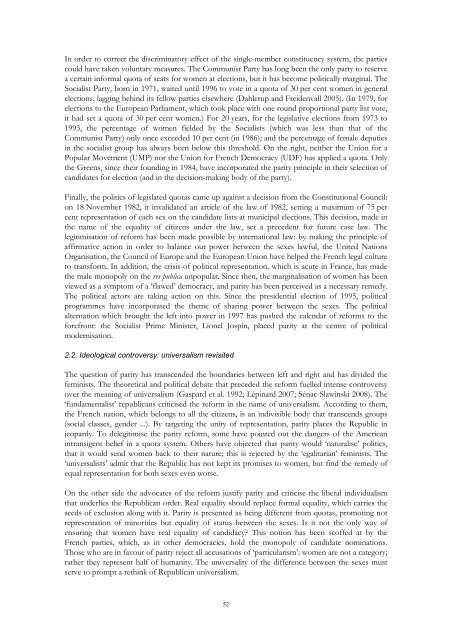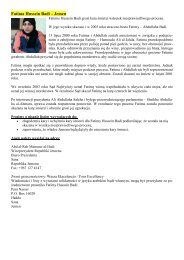In order to correct the discrim<strong>in</strong>atory effect of the s<strong>in</strong>gle-member constituency system, the partiescould have taken voluntary measures. The Communist Party has long been the only party to reservea certa<strong>in</strong> <strong>in</strong>formal quota of seats for women at elections, but it has become politically marg<strong>in</strong>al. TheSocialist Party, born <strong>in</strong> 1971, waited until 1996 to vote <strong>in</strong> a quota of 30 per cent women <strong>in</strong> generalelections, lagg<strong>in</strong>g beh<strong>in</strong>d its fellow parties elsewhere (Dahlerup <strong>and</strong> Freidenvall 2005). (In 1979, forelections to the <strong>Europe</strong>an Parliament, which took place with one round proportional party list vote,it had set a quota of 30 per cent women.) For 20 years, for the legislative elections from 1973 to1993, the percentage of women fielded by the Socialists (which was less than that of theCommunist Party) only once exceeded 10 per cent (<strong>in</strong> 1986); <strong>and</strong> the percentage of female deputies<strong>in</strong> the socialist group has always been below this threshold. On the right, neither the Union for aPopular Movement (UMP) nor the Union for French Democracy (UDF) has applied a quota. Onlythe Greens, s<strong>in</strong>ce <strong>their</strong> found<strong>in</strong>g <strong>in</strong> 1984, have <strong>in</strong>corporated the parity pr<strong>in</strong>ciple <strong>in</strong> <strong>their</strong> selection ofc<strong>and</strong>idates for election (<strong>and</strong> <strong>in</strong> the decision-mak<strong>in</strong>g body of the party).F<strong>in</strong>ally, the politics of legislated <strong>quotas</strong> came up aga<strong>in</strong>st a decision from the Constitutional Council:on 18 November 1982, it <strong>in</strong>validated an article of the law of 1982, sett<strong>in</strong>g a maximum of 75 percent representation of each sex on the c<strong>and</strong>idate lists at municipal elections. This decision, made <strong>in</strong>the name of the equality of citizens under the law, set a precedent for future case law. Thelegitimisation of reform has been made possible by <strong>in</strong>ternational law: by mak<strong>in</strong>g the pr<strong>in</strong>ciple ofaffirmative action <strong>in</strong> order to balance out power between the sexes lawful, the United NationsOrganisation, the Council of <strong>Europe</strong> <strong>and</strong> the <strong>Europe</strong>an Union have helped the French legal cultureto transform. In addition, the crisis of political representation, which is acute <strong>in</strong> France, has madethe male monopoly on the res publica unpopular. S<strong>in</strong>ce then, the marg<strong>in</strong>alisation of women has beenviewed as a symptom of a ‘flawed’ democracy, <strong>and</strong> parity has been perceived as a necessary remedy.The political actors are tak<strong>in</strong>g action on this. S<strong>in</strong>ce the presidential election of 1995, politicalprogrammes have <strong>in</strong>corporated the theme of shar<strong>in</strong>g power between the sexes. The politicalalternation which brought the left <strong>in</strong>to power <strong>in</strong> 1997 has pushed the calendar of reforms to theforefront: the Socialist Prime M<strong>in</strong>ister, Lionel Josp<strong>in</strong>, placed parity at the centre of politicalmodernisation.2.2. Ideological controversy: universalism revisitedThe question of parity has transcended the boundaries between left <strong>and</strong> right <strong>and</strong> has divided thefem<strong>in</strong>ists. The theoretical <strong>and</strong> political debate that preceded the reform fuelled <strong>in</strong>tense controversyover the mean<strong>in</strong>g of universalism (Gaspard et al. 1992; Lép<strong>in</strong>ard 2007; Sénac-Slaw<strong>in</strong>ski 2008). The‘fundamentalist’ republicans criticised the reform <strong>in</strong> the name of universalism. Accord<strong>in</strong>g to them,the French nation, which belongs to all the citizens, is an <strong>in</strong>divisible body that transcends groups(social classes, <strong>gender</strong> ...). By target<strong>in</strong>g the unity of representation, parity places the Republic <strong>in</strong>jeopardy. To delegitimise the parity reform, some have po<strong>in</strong>ted out the dangers of the American<strong>in</strong>transigent belief <strong>in</strong> a quota system. Others have objected that parity would ‘naturalise’ politics,that it would send women back to <strong>their</strong> nature; this is rejected by the ‘egalitarian’ fem<strong>in</strong>ists. The‘universalists’ admit that the Republic has not kept its promises to women, but f<strong>in</strong>d the remedy ofequal representation for both sexes even worse.On the other side the advocates of the reform justify parity <strong>and</strong> criticise the liberal <strong>in</strong>dividualismthat underlies the Republican order. Real equality should replace formal equality, which carries theseeds of exclusion along with it. Parity is presented as be<strong>in</strong>g different from <strong>quotas</strong>, promot<strong>in</strong>g notrepresentation of m<strong>in</strong>orities but equality of status between the sexes. Is it not the only way ofensur<strong>in</strong>g that women have real equality of c<strong>and</strong>idacy? This notion has been scoffed at by theFrench parties, which, as <strong>in</strong> other democracies, hold the monopoly of c<strong>and</strong>idate nom<strong>in</strong>ations.Those who are <strong>in</strong> favour of parity reject all accusations of ‘particularism’: women are not a category;rather they represent half of humanity. The universality of the difference between the sexes mustserve to prompt a reth<strong>in</strong>k of Republican universalism.52
3. The legislated texts3.1. The <strong>in</strong>itial lawsThe constitutional law of 8 July 1999, perta<strong>in</strong><strong>in</strong>g to equality between women <strong>and</strong> men, adds thefollow<strong>in</strong>g to article 3 of the constitution: ‘the law grants equal access to women <strong>and</strong> men to electedoffice <strong>and</strong> electoral functions’. It states (article 4) that the political parties ‘contribute to the<strong>implementation</strong> [of this pr<strong>in</strong>ciple] <strong>in</strong> the conditions determ<strong>in</strong>ed by the law’. The reform may havebeen criticised as ‘m<strong>in</strong>imalist’, but it nonetheless l<strong>in</strong>ks a very symbolic break s<strong>in</strong>ce it substitutes a bisexedorder for the universal abstract. Republican France, based on universalism, paradoxicallybecomes the first democracy organised on the basis of parity of representation for both sexes.The law of 6 June 2000, ‘aim<strong>in</strong>g to grant equal access for women <strong>and</strong> men to elected office <strong>and</strong>electoral functions’, is often called the law on parity, even though the word was carefully avoided. Itimposes a double rule – m<strong>and</strong>atory numerical equality of male <strong>and</strong> female c<strong>and</strong>idates for all electionlists, optional for legislative elections.For votes by the List PR system, the law makes it m<strong>and</strong>atory for the parties to present 50 per centof its c<strong>and</strong>idates of each sex (allow<strong>in</strong>g for round<strong>in</strong>g). If they do not abide by this rule, the list is<strong>in</strong>validated. In addition, strict alternation of women’s <strong>and</strong> men’s names is m<strong>and</strong>atory from thebeg<strong>in</strong>n<strong>in</strong>g to the end of the list. Initially, the law allowed a strict alternation for the s<strong>in</strong>gle-roundsystem, <strong>and</strong> an alternation by block of six c<strong>and</strong>idates for the two-round system. S<strong>in</strong>ce the reformsof 2003 <strong>and</strong> 2007, however, (see section 3.2), strict alternation is required for all the list votes. Theelections concerned with the m<strong>and</strong>atory parity of c<strong>and</strong>idacies with strict alternation on the lists areelections to:• the <strong>Europe</strong>an Parliament;• half of the Senate (departments hav<strong>in</strong>g four senators or more);• the regional councils; <strong>and</strong>• the municipal councils <strong>in</strong> towns with 3,500 <strong>in</strong>habitants or more (that is, only 7.7 per cent oftowns).For the s<strong>in</strong>gle-member electoral district system of vot<strong>in</strong>g <strong>in</strong> the general elections, which makes ittechnically difficult to put the pr<strong>in</strong>ciple of equal rights <strong>in</strong>to practice, the law imposes f<strong>in</strong>ancialpenalties. It penalises parties that do not present 50 per cent of <strong>their</strong> c<strong>and</strong>idates from each sex (giveor take 2 per cent). The penalty is deducted from the first tranche of the party subsidy from publicfunds (proportionate to the number of votes obta<strong>in</strong>ed <strong>in</strong> the first round), while the second trancheof the subsidy (proportionate to the number of c<strong>and</strong>idates elected) is still paid <strong>in</strong> full. The subsidiesare cut by a percentage that is equal to half of the difference between the percentage of c<strong>and</strong>idatesof each sex: for example, if a party presents 40 per cent women <strong>and</strong> 60 per cent men on its list, thedifference is 20 po<strong>in</strong>ts <strong>and</strong> the first tranche of the subsidy is reduced by 10 per cent.In its <strong>in</strong>itial version, the law left free of restra<strong>in</strong>t not only the electoral functions of members of theassembly bureaux, <strong>in</strong>clud<strong>in</strong>g mayors, deputy mayors, <strong>and</strong> vice-presidents <strong>and</strong> presidents of regionalcouncils, but also several others:• half of the seats <strong>in</strong> the Senate, elected by the s<strong>in</strong>gle-member electoral district system (<strong>in</strong> thesmall departments);• the departmental assemblies, elected by the s<strong>in</strong>gle-member electoral district system; <strong>and</strong>• the municipal councils <strong>in</strong> towns with less than 3,500 <strong>in</strong>habitants, elected by the majoritysystem (that is, 92.3 per cent of the towns).53
- Page 3 and 4:
Directorate-General Internal Polici
- Page 5 and 6: Electoral Gender Quota Systems andT
- Page 8 and 9: AppendicesThe methodology of the qu
- Page 10 and 11: Table 41. Women’s representation
- Page 12 and 13: 1. Mapping of electoral gender quot
- Page 14 and 15: Committee of Ministers’ Recommend
- Page 16 and 17: have occurred after election day -
- Page 18 and 19: parties and take the form of intern
- Page 20 and 21: Knowledge of different electoral qu
- Page 22 and 23: support for female candidates has s
- Page 24 and 25: of more women in politics. Many opp
- Page 26 and 27: Figure 3. The incremental track mod
- Page 28 and 29: is probably that gender quotas rema
- Page 30 and 31: to gender quotas. Likewise, the dat
- Page 32 and 33: ‘Special organisation for women w
- Page 34 and 35: individual parties that adopt them,
- Page 36 and 37: political party in the Swedish Parl
- Page 38 and 39: then the requirement of 50 per cent
- Page 40 and 41: proportion of women elected in the
- Page 42 and 43: and organisation of women are cruci
- Page 44 and 45: Matland, Richard E., ‘Enhancing W
- Page 46 and 47: Case studyBelgium: a best practice
- Page 48 and 49: While the 1994 act applied to all e
- Page 50 and 51: need to include at least one woman,
- Page 52 and 53: introduced, individual parties adop
- Page 54 and 55: Marissal, Claudie and Hansen, Ingri
- Page 58 and 59: The legal vacuum pertaining to the
- Page 60 and 61: y women in terms of number of seats
- Page 62 and 63: 5. ‘Virtuous dynamic’: the symb
- Page 64 and 65: Case studyGermany: successful quota
- Page 66 and 67: party positions (Gruppenwahlen zu P
- Page 68 and 69: districts, quota rules are often no
- Page 70 and 71: Table 14. Success rates of female a
- Page 72 and 73: Figure 5. Development of the percen
- Page 74 and 75: so far no formal rules have been ad
- Page 76 and 77: Case studyPoland: one step forward,
- Page 78 and 79: 16 in Poland)Rady powiatów(second
- Page 80 and 81: 3. Evaluation3.1. Candidate lists i
- Page 82 and 83: List, in Ozorków Women of Tomorrow
- Page 84 and 85: 3.4. Representation of women in oth
- Page 86 and 87: Case studySlovenia: from voluntary
- Page 88 and 89: council. The positions of candidate
- Page 90 and 91: 3.2.2. The introduction of legislat
- Page 92 and 93: Table 25 shows that only one of the
- Page 94 and 95: Source: Author’s own calculation
- Page 96 and 97: Zakon o volitvah v Evropski parlame
- Page 98 and 99: Advocates for quotas for women lobb
- Page 100 and 101: Table 31. The percentage and number
- Page 102 and 103: Table 33. Municipality elections in
- Page 104 and 105: Case studySweden: small steps, big
- Page 106 and 107:
40 per cent of either sex on the pa
- Page 108 and 109:
voluntary party quotas than in part
- Page 110 and 111:
The zipper system (50 per cent) int
- Page 112 and 113:
While quotas for minority groups ha
- Page 114 and 115:
Case studyThe United Kingdom: polit
- Page 116 and 117:
In contrast to Labour, the Scottish
- Page 118 and 119:
The twinning and zipping policies a
- Page 120 and 121:
differences across the political pa
- Page 122 and 123:
Appendix IThe methodology of the qu
- Page 124 and 125:
Brigitte Geissel is a political sci
- Page 126:
ZLSDZZPUnited List of Social Democr






